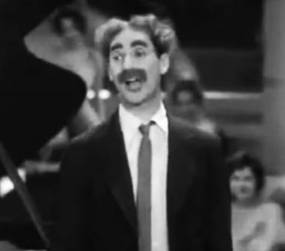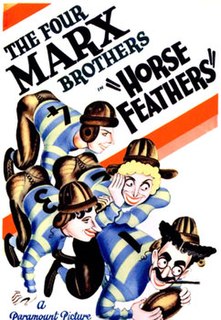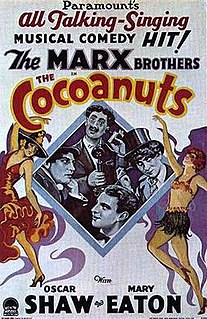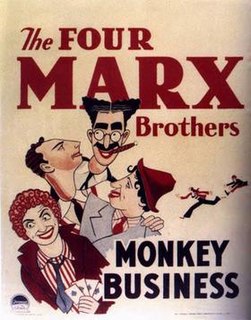
Julius Henry "Groucho" Marx was an American comedian, actor, writer, stage, film, radio, and television star. He is generally considered to have been a master of quick wit and one of America's greatest comedians.

George Simon Kaufman was an American playwright, theatre director and producer, humorist, and drama critic. In addition to comedies and political satire, he wrote several musicals for the Marx Brothers and others. He won the Pulitzer Prize for Drama for the musical Of Thee I Sing in 1932, and won again in 1937 for the play You Can't Take It with You. He also won the Tony Award for Best Director in 1951 for the musical Guys and Dolls.

The Marx Brothers were an American family comedy act that was successful in vaudeville, on Broadway, and in motion pictures from 1905 to 1949. Five of the Marx Brothers' thirteen feature films were selected by the American Film Institute (AFI) as among the top 100 comedy films, with two of them, Duck Soup (1933) and A Night at the Opera (1935), in the top fifteen. They are widely considered by critics, scholars and fans to be among the greatest and most influential comedians of the 20th century. The brothers were included in AFI's 100 Years... 100 Stars list of the 25 greatest male stars of Classical Hollywood cinema, the only performers to be inducted collectively.

Animal Crackers is a 1930 American pre-Code Marx Brothers comedy film directed by Victor Heerman. The film stars the Marx Brothers, Groucho, Chico, Harpo, and Zeppo, with Lillian Roth and Margaret Dumont. It was based on their broadway musical of the same name, in which mayhem and zaniness ensue when a valuable painting goes missing during a party in honor of famed African explorer Captain Jeffrey T. Spaulding. A critical and commercial success upon its initial release, it was filmed at Paramount's Astoria Studios in Astoria, Queens; it was the second of two films the Brothers would make in New York City.

Duck Soup is a 1933 pre-Code comedy film written by Bert Kalmar and Harry Ruby, with additional dialogue by Arthur Sheekman and Nat Perrin, directed by Leo McCarey. Released theatrically by Paramount Pictures on November 17, 1933, it starred the Marx Brothers and also featured Margaret Dumont, Louis Calhern, Raquel Torres and Edgar Kennedy. It was the last Marx Brothers film to feature Zeppo and the last of five Marx Brothers movies released by Paramount Pictures. Groucho plays the newly installed president of the mythical country of Freedonia, and Zeppo is his secretary, while Harpo and Chico are spies for the rival country of Sylvania. Relations between Groucho and the Sylvanian ambassador deteriorate during the film, and they go to war at the conclusion.

A Night at the Opera is a 1935 American comedy film starring the Marx Brothers, and featuring Kitty Carlisle, Allan Jones, Margaret Dumont, Sig Ruman, and Walter Woolf King. It was the first of five films the Marx Brothers made under contract for Metro-Goldwyn-Mayer after their departure from Paramount Pictures, and the first after Zeppo left the act. The film was written by George S. Kaufman and Morrie Ryskind from a story by James Kevin McGuinness, with additional uncredited dialogue by Al Boasberg. The film was directed by Sam Wood.

Leonard Joseph "Chico" Marx was an American comedian, musician, and actor. He was the oldest brother and a member of the Marx Brothers. His persona in the act was that of a charming, uneducated but crafty con artist, seemingly of rural Italian origin, who wore shabby clothes and sported a curly-haired wig and Tyrolean hat. On screen, Chico is often in alliance with Harpo, usually as partners in crime, and is also frequently seen trying to con or outfox Groucho. Leonard was the oldest of the Marx Brothers to live past early childhood. In addition to his work as a performer, he played an important role in the management and development of the act in its early years.

Herbert Manfred "Zeppo" Marx was an American actor, comedian, theatrical agent, and engineer. He was the youngest and last survivor of the five Marx Brothers. He appeared in the first five Marx Brothers feature films, from 1929 to 1933, but then left the act to start his second career as an engineer and theatrical agent.

Margaret Dumont was an American stage and film actress. She is best remembered as the comic foil to the Marx Brothers in seven of their films. Groucho Marx called her "practically the fifth Marx brother."

Captain Jeffrey T. Spaulding is a fictional character in the Broadway musical Animal Crackers and the film of the same name. He was originally played by actor Groucho Marx, one of the Marx Brothers, in both productions. Despite his middle name being Edgar, he is known as Jeffrey T. Spaulding; his first name is also spelled as "Geoffrey" in parts of the film.

You Bet Your Life is an American comedy quiz series that aired on both radio and television. The original and best-known version was hosted by Groucho Marx of the Marx Brothers, with announcer and assistant George Fenneman. The show debuted on ABC Radio on October 27, 1947, then moved to CBS Radio debuting October 5, 1949, before making the transition to NBC-TV and NBC Radio on October 4, 1950. Because of its simple format, it was possible to broadcast the show on both radio and television but not simultaneously. Because many of the laughs on the television show were evoked by Groucho's facial reactions and other visual gimmicks, the two versions were slightly different. The last episode in its radio format aired on June 10, 1960. On television, however, the series continued for another year, debuting in its final season on September 22, 1960, and with a new title, The Groucho Show.

Horse Feathers is a 1932 pre-Code comedy film starring the Marx Brothers. It stars the Marx Brothers, Thelma Todd and David Landau. It was written by Bert Kalmar, Harry Ruby, S. J. Perelman, and Will B. Johnstone. Kalmar and Ruby also wrote the original songs for the film. Several of the film's gags were taken from the Marx Brothers' stage comedy from the 1900s, Fun in Hi Skule. The term "horse feathers" is an American euphemism for "horseshit," meaning "nonsense," originating in the late 1920s.

The Cocoanuts is a 1929 pre-Code musical comedy film starring the Marx Brothers. Produced for Paramount Pictures by Walter Wanger, who is not credited, the film also stars Mary Eaton, Oscar Shaw, Margaret Dumont and Kay Francis. It was the first sound film to credit more than one director, and was adapted to the screen by Morrie Ryskind from the George S. Kaufman Broadway musical play. Five of the film's tunes were composed by Irving Berlin, including "When My Dreams Come True", sung by Oscar Shaw and Mary Eaton.

Monkey Business is a 1931 American pre-Code comedy film. It is the third of the Marx Brothers' released movies, and the first with an original screenplay rather than an adaptation of one of their Broadway shows. The film also features Thelma Todd, Harry Woods and Ruth Hall. It is directed by Norman Z. McLeod with screenplay by S. J. Perelman and Will B. Johnstone. Much of the story takes place on an ocean liner crossing the Atlantic Ocean.

The Big Store is an American comedy film starring the Marx Brothers released in 1941, with Groucho, Chico and Harpo wreaking havoc in a large department store. Groucho appears as private detective Wolf J. Flywheel.

The "Schnitzelbank" is a simple song, popular primarily with German Americans.

Morris "Morrie" Ryskind was an American dramatist, lyricist and writer of theatrical productions and motion pictures, who became a conservative political activist later in life.

I'll Say She Is (1924) is a musical comedy revue written by brothers Will B. Johnstone and Tom Johnstone (music). It was the Broadway debut of the Marx Brothers. A revival of I'll Say She Is, as "adapted and expanded" by the writer-performer Noah Diamond, was seen Off Broadway at the Connelly Theater in 2016.
The Mad, Mad, Mad Comedians is a 1970 American animated television special produced by Rankin/Bass Productions. After the Christmas special Frosty the Snowman (1969), it was Rankin/Bass' second hand-drawn animated work to be outsourced to Osamu Tezuka's Mushi Production in Tokyo, Japan. The show aired on ABC on April 7, 1970 before the airing of that year's Oscars. It was a tribute to early vaudeville, and featured animated reworkings of various famous comedians' acts.

Copacabana is a 1947 American musical comedy film directed by Alfred E. Green starring Carmen Miranda and Groucho Marx.



















